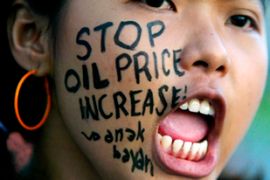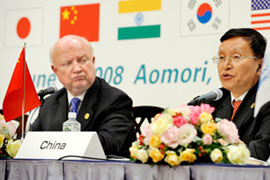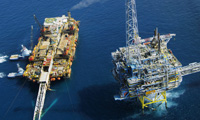Asia markets fall on oil fears
Opec rejects calls by major powers to up output, saying high price beyond its control.

The falling markets come in the wake of surging oil prices, which shot up more than $16, or 13 per cent, late last week.
However, Shokri Ghanem, the head of Opec member Libya’s National Oil Corporation, told Reuters “there is enough oil in the market”.
| Your Views |
While Opec officials acknowledged that prices were likely to climb further, Ali al-Naimi, oil minister for Saudi Arabia, the world’s top oil exporter and only Opec member with the capacity to boost output quickly and significantly, said the price rise was unjustified and unrelated to market fundamentals.
Instead, the oil grouping blames factors beyond its control, including speculation and international political tension.
Cutting fuel subsidies
Several governments of developing countries have decided to cut fuel subsidies as a result of the soaring prices, passing the cost on to consumers and risking a political backlash.
Speaking at the Asia Oil and Gas conference in Kuala Lumpur on Monday, Abdullah Ahmad Badawi, Malaysia’s prime minister, said cutting subsidies was unavoidable.
“Fuel subsidies were seen as a benign way for governments to ensure the good quality of life for its citizens. Today, this is no longer the case.
| In depth | |
Q&A: Why oil prices keep rising |
“With oil prices reaching $130 per barrel, governments the world over are staring into the financial abyss as fuel subsidies threaten to run amok.”
Oil prices did fall by more than a dollar in the first few hours of trading in Asia on Monday.
That, however, was unlikely to ease the concerns of economic ministers from the world’s richest countries.
The governments of 11 nations that consume nearly two-thirds of the world’s energy on Sunday called for an immediate increase in oil production in view of soaring fuel prices.
G8 countries the US, UK, Canada, Italy, Japan, France, Germany and Russia, along with China, India and South Korea, were holding energy talks in the Japanese city of Aomori, 600km north of Tokyo.
Global recession warning
“If we leave this situation as it is, it could lead to a recession of the world economy,” Akira Amari, Japan’s energy minister, the host of the meeting, said in his opening address.
But no one within Opec was calling for an early meeting where a decision to increase output could be made, Libya‘s Ghanem said.
And only a real threat to supply would spur Opec – which accounts for about two-thirds of the world’s oil reserves but less than 40 per cent of the world’s oil production – to meet before its next scheduled gathering on September 9, an insider said on Sunday.
| Rising prices, record profits |
|
Conaco Phillips: $12bn Chevron: $19bn |
Amari said that the 11 nations meeting in Aomori together consume 65 per cent of world energy while also releasing 65 per cent of the carbon dioxide emissions blamed for global warming.
“Climate change and energy issues are two sides of the same coin,” Amari said. “It is indispensable to solve these problems together.”
The 11-nation talks came a day after US and four Asian nations voiced “serious concerns” about rising oil prices in a separate round of talks and called for more investment to keep markets well supplied.
Despite global economic growth and a surge in demand from China and India, since 2005 world oil production has not risen from the 85 million bpd level.
Lowering consumption key
However, Chandran Nair, from the Global Institute for Tomorrow, told Al Jazeera that increasing oil supply was not a solution.
 |
| Steep fuel price hikes in some Asian countries have hit consumers hard [Reuters] |
“Increasing supply is a knee-jerk reaction you would expect from politicians. It’s politically expedient to say we have to produce more … it’s intellectually lazy,” Nair said.
“But look at long-term issues facing the world … it doesn’t take a genius to understand we have to reduce the amount of oil we consume.”
Likewise, Manouchehr Takin, a senior policy analyst with the Centre for Global Energy Studies, told Al Jazeera that asking Opec to produce more oil output is only a partial answer.
“[Even] if Saudi Arabia announces that it is going to increase production, what will happen if prices go up due to world events, for example, [due to] Israeli threats to destroy Iranian installations?,” he said.
“There are many factors here that need to be considered.”
Saadallah Fathi, the former head of energy research at Opec in Vienna and a former adviser to the Iraqi oil ministry, said: “Oil suppliers are perfectly able to meet the demand.
“There is plenty of oil and no demands from countries asking for oil have ever been turned down. Some countries produce more than they can sell.
Speculation blamed
“The hike is due to speculations of investors who are moving a lot of money into the oil future market due to the weakness of the dollar and other stocks.
 |
| Leaders of 11 major energy consumers urged increased oil output [AFP] |
“Some analysts have already forecast the price per barrel will hit $150 by July [and] growing economies are being [badly] hurt.”
In fact, rising oil prices have defied swelling Opec supplies.
Iran said on Sunday it would export over 2.5 million barrels per day (bpd) in June as shipments recovered from a 200,000 bpd lull in demand from refiners during April and May.
The country has large volumes of crude sitting in tankers offshore waiting for buyers.
Saudi Arabia has boosted output 300,000 bpd to pump 9.45 million bpd in June, and al-Naimi said last month the kingdom was meeting all demand for its crude.
Iraq expects its exports to hit a five-year high in June.
Still, concerns over long-term supplies and declining output from producers outside Opec have helped to lift the oil price.
Ghanem said on Sunday that oil was getting more difficult and costly to produce and that global supplies were nearing their peak.
“The easy, cheap oil is over,” he said. “Peak oil is looming.”

